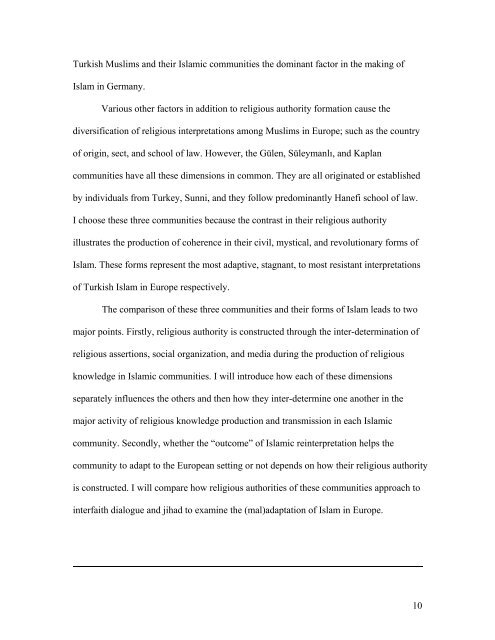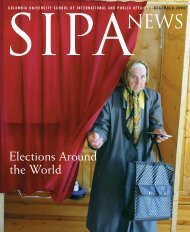Anthropology of Islamic Knowledge - SIPA
Anthropology of Islamic Knowledge - SIPA
Anthropology of Islamic Knowledge - SIPA
You also want an ePaper? Increase the reach of your titles
YUMPU automatically turns print PDFs into web optimized ePapers that Google loves.
Turkish Muslims and their <strong>Islamic</strong> communities the dominant factor in the making <strong>of</strong><br />
Islam in Germany.<br />
Various other factors in addition to religious authority formation cause the<br />
diversification <strong>of</strong> religious interpretations among Muslims in Europe; such as the country<br />
<strong>of</strong> origin, sect, and school <strong>of</strong> law. However, the Gülen, Süleymanlı, and Kaplan<br />
communities have all these dimensions in common. They are all originated or established<br />
by individuals from Turkey, Sunni, and they follow predominantly Hanefi school <strong>of</strong> law.<br />
I choose these three communities because the contrast in their religious authority<br />
illustrates the production <strong>of</strong> coherence in their civil, mystical, and revolutionary forms <strong>of</strong><br />
Islam. These forms represent the most adaptive, stagnant, to most resistant interpretations<br />
<strong>of</strong> Turkish Islam in Europe respectively.<br />
The comparison <strong>of</strong> these three communities and their forms <strong>of</strong> Islam leads to two<br />
major points. Firstly, religious authority is constructed through the inter-determination <strong>of</strong><br />
religious assertions, social organization, and media during the production <strong>of</strong> religious<br />
knowledge in <strong>Islamic</strong> communities. I will introduce how each <strong>of</strong> these dimensions<br />
separately influences the others and then how they inter-determine one another in the<br />
major activity <strong>of</strong> religious knowledge production and transmission in each <strong>Islamic</strong><br />
community. Secondly, whether the “outcome” <strong>of</strong> <strong>Islamic</strong> reinterpretation helps the<br />
community to adapt to the European setting or not depends on how their religious authority<br />
is constructed. I will compare how religious authorities <strong>of</strong> these communities approach to<br />
interfaith dialogue and jihad to examine the (mal)adaptation <strong>of</strong> Islam in Europe.<br />
10

















